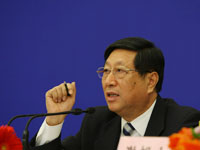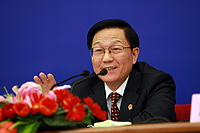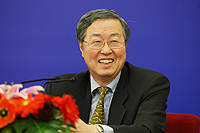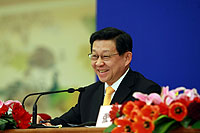| The GDP grew 8.7 percent year on year in 2009, beating the government-set target of 8 percent. Though overshadowed by the turbo-charged growth rate the country enjoyed in previous years, the turnaround was swift enough to make China the first major economic power to tide over the downturn.
At a press conference during the Third Session of the 11th National People's Congress, Zhang Ping, Minister of the National Development and Reform Commission (NDRC); Xie Xuren, Minister of Finance; Zhou Xiaochuan, Governor of the People's Bank of China; and Chen Deming, Minister of Commerce, wrapped up discussions on economic situations facing the country and pointed to a bright prospect for future growth.
Shrugging off the downturn
 |
|
Zhang Ping, Minister of the National Development and Reform Commission (JIANG XIAOYING) | The 4-trillion-yuan ($586 billion) stimulus package has been an important part of China's countermeasures to the financial crisis, said Zhang Ping, Minister of NDRC. First, the stimulus package delivered a strong boost to market sentiment and strengthened confidence to shake off the downturn. Second, it has effectively widened domestic demands, allowing the economy to reduce its dependence on exports. Third, massive investments have properly addressed problems of the economy glossed over in past boom times. Fourth, the package is helpful with improving the people's livelihood and conditions for industrial productions. Fifth, China's bailout plan also had a positive impact for the recovery of the world economy, and provided a fresh source of confidence for the crisis-stricken Western world.
More specifically, the Central Government allocated 924.3 billion yuan ($135.4 billion) in public investments in 2009, 503.8 billion yuan ($73.8 billion) more than the previous year's budget, according to Zhang.
All money was effectively used to revitalize the economy and no capital went into the real estate market, energy-guzzling sectors, highly polluting industries or exports of resource products, he said.
Around 44 percent of the capital was distributed to affordable housing projects, rural infrastructure, social welfare, education and culture. Around 16 percent of the investments were used to support industrial innovation and technological upgrades, energy conservation and emission reduction, as well as environmental protection, said Zhang.
Infrastructure projects including railways, highways, airports and ports accounted for 23 percent of Central Government investments, and reconstruction in quake-hit areas made up 14 percent, he added.
Fiscal vitality
 |
|
Xie Xuren, Minister of Finance (JIANG XIAOYING) | In response to the international financial crisis, the Chinese Government put in place a proactive fiscal policy and moderately easy monetary policy, and further improved its stimulus packages, said Xie Xuren, Minister of Finance. Over the past year, fiscal departments at all levels carefully implemented the proactive fiscal policy by enhancing public investments and spurring domestic consumption.
The government pressed ahead with structural tax reductions as a commitment to helping with investments of enterprises and residential consumptions. Meanwhile, vigorous efforts were made to improve people's livelihood, including education, health insurance, affordable houses and environmental protection, Xie said.
These efforts have obviously accelerated rebalancing of the economy and helped ensure a stable and healthy growth prospect, added Xie.
Looking ahead, China will have a much better economic environment this year than in 2009, but the foundation of recovery remains unsteady. So it is necessary to maintain continuity and stability of the policies, said Xie.
This year's 1.05-trillion-yuan ($154 billion) deficit will be comparable to 2.8 percent of estimated GDP in 2010, a tolerable and basically safe level of debt. But it is still needed to strengthen management over local governments' debts and fend off possible fiscal risks. Efforts are needed to streamline the financing vehicles of local governments to promote sustainable development of local economies, said Xie.
Supportive measures are also in place for hi-tech industries, environmentally friendly businesses and the service sector, added Xie.
Guarding against crisis
 |
|
Zhou Xiaochuan, Governor of the People's Bank of China (JIANG XIAOYING) | China will adjust its monetary policy according to changes with the country's economic indicators and feedback from policy implementation, said Zhou Xiaochuan, Governor of the People's Bank of China, the central bank.
The government will continue with a moderately easy monetary policy but at the same time closely follow the inflation issue and unfolding economic scenarios, Zhou said, noting that inflation control will be more complicated this year.
China will eventually have to withdraw its economic stimulus package sooner or later, but the timing must be treated with great caution, Zhou added.
The country will enhance the focus and flexibility of its policies and strike a balance between inflation expectation management and maintaining sound growth, he said.
Zhou also showed concerns about China's holdings of U.S. dollar assets. China is currently the biggest foreign holder of U.S. Treasury debts, but recent depreciation of the U.S. dollar has aroused concerns about safety of the dollar investments. The greenback is still a key currency in global trade, and China will closely monitor its trend in value against other currencies, Zhou said.
Export conundrum
 |
|
Chen Deming, Minister of Commerce (JIANG XIAOYING) | As a result of the serious global recession, China's exports fell a hefty 16 percent last year, forcing painful factory closures and sending numerous migrant workers home. The export woes, however, have showed signs of healing this year, but China still faces an uphill battle to pick up the slack on the trade front. The world economy still remains fragile and volatile, casting an ominous shadow over the trade sector, said Chen Deming, Minister of Commerce.
The United States, for example, is still reeling from staggering unemployment while southeastern European countries are confronted with sovereign debt risks. That is why China should have a basic understanding of the global economy and press ahead with stiff efforts to revitalize exports, he said.
Meanwhile, China has taken measures to support imports and keep a relatively balanced trade account. The trade surplus in 2009 shrank by 34 percent to around $196 billion. As imports continued to pick up this year, the surplus in the first two months of 2010 dropped 50.2 percent from the same period last year, according to Chen.
More specifically, China derives 73 percent of its surplus from the United States and 55 percent from the EU. At the same time, China is recording trade deficits with more than 50 countries worldwide, he said.
China's huge surplus with the United States is resulted from serious restrictions on exports to China. This is unfair for U.S. residents and entrepreneurs, and also harmful to employment and the recovery of the crisis-stricken U.S. economy, notably against the background that President Obama pledged to double U.S. exports in five years, said Chen. |
